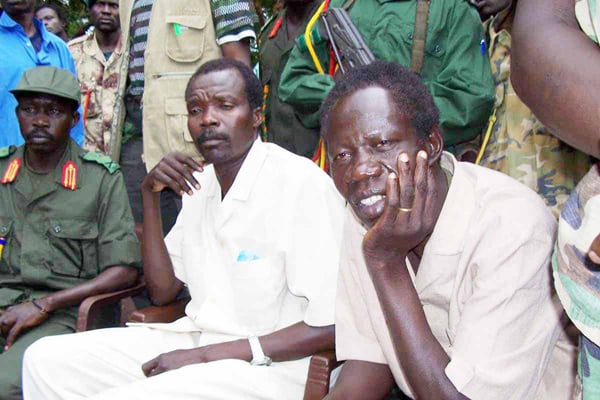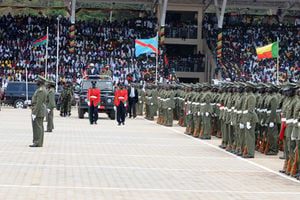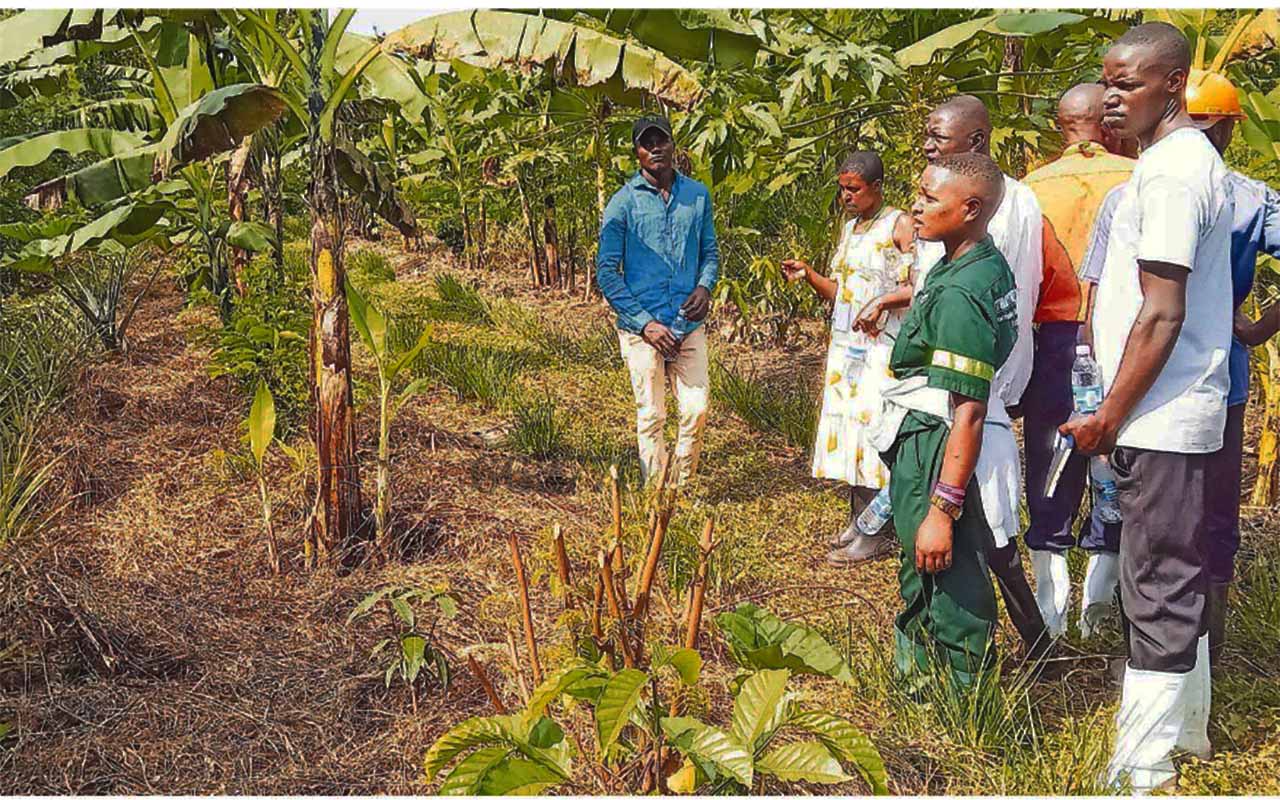
Ugandan fugitive and Lord’s Resistance Army (LRA) rebel group leader Joseph Kony.
Maj Gen Salim Saleh’s prediction of the rebel leaders’ death came about a month after the October 1 deadline he had earlier given to wipe out the Kony rebels had expired.
Twenty eight years ago late in October, President Museveni announced that he had dropped Maj Gen Elly Tumwine as the head of the Internal Security Organisation (ISO), replacing him with Mr Phillip Idro.
A press statement issued by State House on October 29 also announced changes in the hierarchy of the External Security Organisation (ESO), where Mr David Pulkol was named the new director general (DG), with former minister of State for Agriculture, Ms Joan Rwabyomere, as deputy director general.
“All appointments take immediate effect,” the press release said. According to Monitor’s edition of October 30, 1996, Gen Tumwine was dropped shortly after President Museveni was compelled to assemble a team led by then First Deputy Prime Minister Eria Kategaya and charged it with investigating allegations of mismanagement in ESO. The team had by the time of the shakeup not outed a report.
Gen Tumwine was appointed a special presidential advisor on mass mobilisation, joining what the newspaper described as “a host of others in what is largely regarded as a collecting bag for political pensioners”.
The newspaper, however, pointed out that it was the first time that non-founder members of the ruling National Resistance Movement (NRM) had been appointed to the two security organisations. At the time Mr Idro was the Electoral Commission’s commissioner in charge of western Uganda, while Pulkol was the MP for Matheniko County, Moroto District.
The appointment meant that Mr Idro became only the second DG of ISO, replacing Maj Gen Jim Muhwezi who had headed the organisation since 1986 when the NRM shot its way to power. Gen Muhwezi had been appointed minister of State for Education following his election as MP for Rujumbura County during parliamentary elections earlier that year. The post of ISO DG had been vacant since Gen Muhwezi’s appointment to Cabinet.
On the other hand, Mr Pulkol was the fourth head of ESO after Mr Amama Mbabazi, Maj Gen Kahinda Otafiire and Gen Tumwine respectively. The appointments also meant that it was the first time that a female had been appointed to such a high position in security circles.
Reward
The newspaper suggested that Mr Pulkol’s appointment came as no surprise as he was always bound to be rewarded for the work done for the President during the campaigns ahead of the 1996 presidential elections, in which Mr Museveni was declared the winner with 4,428,119 votes which represented 74.2 percent of the total vote.
Paul Kawanga Ssemogerere, the joint candidate of the proponents of multiparty democracy, came second with 1,416,139 votes, which represented 23.8 percent of the vote, while Mr Mohammed Kibirige Mayanja came third with 120,000 votes.
The newspaper reported that Pulkol had “earlier on in the run-up to the crucial May 9 presidential elections headed the Kakuyege team that Museveni hastily assembled when his official campaign task force appeared to be faltering”.
It also reported that he had headed “a secret high-powered 80-man task force which fought the nationwide traders’ strike against Value Added Tax (VAT) – one of the biggest civil challenges to the NRM government in recent times”.He was also credited with “having extensive knowledge of and connections with Sudan”. Sudan was at the time the biggest thorn in Museveni’s side.
UPDF ready to enter Sudan
As Mr Museveni was shuffling the leadership of security agencies, Maj Roland Kakooza Mutale, the President’s political advisor, was speaking in the District Council Hall in Gulu where he told about 200 NRM cadres that the army was ready to make an incursion into the Sudan.
“You never know when Sudan will attack us. But if [Lord’s Resistance Army (LRA) leader Joseph] Kony crosses [back to Uganda], we too will cross. You will only hear I am in Juba,” he declared.
He urged the newly trained cadres, products of a politicisation course known as chaka-mchaka, to be vigilant and promptly identify and report bad characters in society. He also warned them against rumour-mongering and discussing Uganda Peoples' Defence Forces (UPDF) troop movements and deployments. Journalists were not spared the warnings.
“Those who want to report about Kony should go behind Kony lines and report from there. I would be offended by war correspondents who report on Kony positively from behind the UPDF line,” he said.
Kakooza-Mutale urged the cadres to take up the role of defending the villages and leave the rest to the army.
“The big guns from Sudan will be our [UPDF] work,” he said

Joseph Kony (centre) and his deputy Vincent Otti (right) during a meeting in 2005. PHOTO | FILE
Saleh predicts Kony death
In yet another related development Maj Gen Salim Saleh, the presidential advisor on military affairs, who was at the time the army’s topmost commander in the north, declared that Kony would be killed if he crossed back into Uganda from his bases in South Sudan.
“We are waiting, should he come back to Uganda this time he is a dead man,” Gen Saleh told this newspaper on phone from his base in Gulu barracks.
At the time, Lt Col Alex Otti Lagony, LRA’s field commander, had been reported injured during a gunfight with the UPDF, but Gen Saleh dismissed claims that his absence from the war theatre had made things easier for the army.“
The job is already easy. Although we know that Otti is hiding in his home area of Koch Goma and he is detached from the rest of the rebels,” he said.
During the same phone interview, Gen Saleh repeated an earlier appeal to Parliament to allow the UPDF to pursue LRA rebels into the Sudan.
“What international law were the Americans following when they entered Panama to get Noriega? You see what we have here are Ugandan laws. We have a Constitution and the army should defend it, but when someone wants to overthrow it from an outside source, the army has to defend its country,” Gen Saleh said.
General Saleh also doubted that Sudan would retaliate, a development which would lead to a full-scale war if Uganda went into Sudan in pursuit of Kony and his rebels.“That would be an occupational hazard, but I don’t think so. We are not going there to fight. We shall just go there and get them [the rebels],” Saleh said.
Museveni’s loses bet
Saleh’s prediction of the rebel leaders’ death came about a month after the October 1 deadline he had earlier given to wipe out the Kony rebels had expired.
It was not the first time that a top military official had predicted Kony’s demise. President Museveni during a March 6, 1996, press conference bet Shs1 million to have Kony’s scalp. The six-month period expired on September 6.
By the time the President made the bet, he was camped in Gulu to oversee a counter-insurgency operation, using a combined armed element strategy which involved the simultaneous use of helicopter gunships and the infantry, including the use of armoured personnel carriers (APCs) for rapid troop movement.
The President lost the bet to journalist Tamale Mirundi. Saleh’s prediction also did not come to pass.Kony is in the meantime alive and kicking. He is believed to be in hiding in the Central African Republic where he is believed to be operating a camp.






